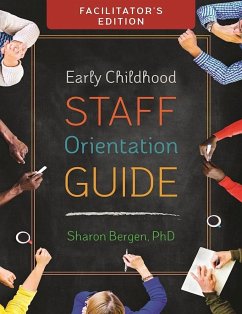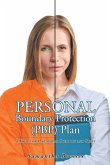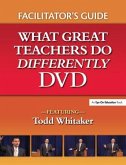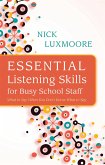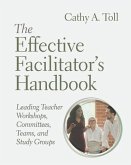Sharon Bergen
Early Childhood Staff Orientation Guide: Facilitator's Edition
Schade – dieser Artikel ist leider ausverkauft. Sobald wir wissen, ob und wann der Artikel wieder verfügbar ist, informieren wir Sie an dieser Stelle.
Sharon Bergen
Early Childhood Staff Orientation Guide: Facilitator's Edition
- Broschiertes Buch
- Merkliste
- Auf die Merkliste
- Bewerten Bewerten
- Teilen
- Produkt teilen
- Produkterinnerung
- Produkterinnerung
Along with orientation on topics vital to early childhood professionals, this guide includes information just for mentors. Find valuable tools and tips to maximize mentoring skills and respond to frequently asked questions about the orientation process. Use this book to ensure you make the most of each new employee's potential.
Andere Kunden interessierten sich auch für
![Ethnographic Interviewing for Teacher Preparation and Staff Development Ethnographic Interviewing for Teacher Preparation and Staff Development]() Carolyn FrankEthnographic Interviewing for Teacher Preparation and Staff Development35,99 €
Carolyn FrankEthnographic Interviewing for Teacher Preparation and Staff Development35,99 €![Personal Boundary Protection (PBP) Plan: A Tool for Oklahoma Schools and Staff Personal Boundary Protection (PBP) Plan: A Tool for Oklahoma Schools and Staff]() Samantha BrassesPersonal Boundary Protection (PBP) Plan: A Tool for Oklahoma Schools and Staff11,99 €
Samantha BrassesPersonal Boundary Protection (PBP) Plan: A Tool for Oklahoma Schools and Staff11,99 €![What Great Teachers Do Differently Facilitator's Guide What Great Teachers Do Differently Facilitator's Guide]() Todd WhitakerWhat Great Teachers Do Differently Facilitator's Guide20,99 €
Todd WhitakerWhat Great Teachers Do Differently Facilitator's Guide20,99 €![Essential Listening Skills for Busy School Staff Essential Listening Skills for Busy School Staff]() Nick LuxmooreEssential Listening Skills for Busy School Staff27,99 €
Nick LuxmooreEssential Listening Skills for Busy School Staff27,99 €![The Effective Facilitator's Handbook The Effective Facilitator's Handbook]() Cathy A TollThe Effective Facilitator's Handbook29,99 €
Cathy A TollThe Effective Facilitator's Handbook29,99 €
Along with orientation on topics vital to early childhood professionals, this guide includes information just for mentors. Find valuable tools and tips to maximize mentoring skills and respond to frequently asked questions about the orientation process. Use this book to ensure you make the most of each new employee's potential.
Produktdetails
- Produktdetails
- Verlag: Redleaf Press
- Facilitator's edition
- Seitenzahl: 152
- Erscheinungstermin: 5. Juli 2016
- Englisch
- Abmessung: 272mm x 211mm x 13mm
- Gewicht: 476g
- ISBN-13: 9781605544328
- ISBN-10: 1605544329
- Artikelnr.: 43892304
- Herstellerkennzeichnung
- Libri GmbH
- Europaallee 1
- 36244 Bad Hersfeld
- gpsr@libri.de
- Verlag: Redleaf Press
- Facilitator's edition
- Seitenzahl: 152
- Erscheinungstermin: 5. Juli 2016
- Englisch
- Abmessung: 272mm x 211mm x 13mm
- Gewicht: 476g
- ISBN-13: 9781605544328
- ISBN-10: 1605544329
- Artikelnr.: 43892304
- Herstellerkennzeichnung
- Libri GmbH
- Europaallee 1
- 36244 Bad Hersfeld
- gpsr@libri.de
Sharon Bergen has over thirty years of experience in the profession as a teacher, program director, multi-site manager, trainer, and more. She is currently an instructor of Early Childhood and Youth Development at Dakota County Technical College. Sharon is the author of several books including Best Practices for Training Early Childhood Professionals and Healthy Children Healthy Lives: The Wellness Guide for Early Childhood Programs.
Overview for Mentors and Supervisors
Orientation Matters
-Program Requirements
-Creating a First Impression
Charcteristics of Effective Mentors
-Protege Needs
-Mentor Needs and Benefits
Frequently Asked Questions
Introduction
Chapter 1: About Young Children
Child Development Basics
-Principles of Development
-Infants
-Toddlers
-Preschoolers
Interacting with young children
-Intentional Behaviors
-Child Guidance
Ethical considerations involved in working with children and families
-Do No Harm Principle
-Confidentiality
-Partnerships with Families and Colleagues
Check Your Learning
Chapter 2: Protecting Children's Health and Safety
Illness Prevention
-Hand-washing
-Cleaning, sanitizing, and disinfecting
-Excluding ill children
Injury prevention
-Safety checks
-Supervision
-Child abuse prevention
Emergency preparedness
-Child Injuries
-Emergencies
Check Your Learning
Chapter 3: A Day in the Program
Arrival Routines
Meals and Snacks
-Feeding Infants
-Toddler and Preschool Meals and Snacks
Diapering and Toileting
-Diapering
-Toileting
Outdoor Play
Naptime Routines and Safe Sleep
-Safe Sleep for Infants
-Nap Guidelines and Routines
Learning activities
-Program Goals, Curriculum, and Assessment
-Group activities
-Room arrangement and equipment
-Transitions
Communicating with Families
-Informal Conversations
-Formal Communications
Departure routines
Team Communications
Check Your Learning
Chapter 4: Conclusion
Professionalism
-Personal Appearance
-Professional Behaviors
Continuing Your Learning
-Everyday Learning
-Professional Development Planning
Chapter 5: Resources
Orientation Matters
-Program Requirements
-Creating a First Impression
Charcteristics of Effective Mentors
-Protege Needs
-Mentor Needs and Benefits
Frequently Asked Questions
Introduction
Chapter 1: About Young Children
Child Development Basics
-Principles of Development
-Infants
-Toddlers
-Preschoolers
Interacting with young children
-Intentional Behaviors
-Child Guidance
Ethical considerations involved in working with children and families
-Do No Harm Principle
-Confidentiality
-Partnerships with Families and Colleagues
Check Your Learning
Chapter 2: Protecting Children's Health and Safety
Illness Prevention
-Hand-washing
-Cleaning, sanitizing, and disinfecting
-Excluding ill children
Injury prevention
-Safety checks
-Supervision
-Child abuse prevention
Emergency preparedness
-Child Injuries
-Emergencies
Check Your Learning
Chapter 3: A Day in the Program
Arrival Routines
Meals and Snacks
-Feeding Infants
-Toddler and Preschool Meals and Snacks
Diapering and Toileting
-Diapering
-Toileting
Outdoor Play
Naptime Routines and Safe Sleep
-Safe Sleep for Infants
-Nap Guidelines and Routines
Learning activities
-Program Goals, Curriculum, and Assessment
-Group activities
-Room arrangement and equipment
-Transitions
Communicating with Families
-Informal Conversations
-Formal Communications
Departure routines
Team Communications
Check Your Learning
Chapter 4: Conclusion
Professionalism
-Personal Appearance
-Professional Behaviors
Continuing Your Learning
-Everyday Learning
-Professional Development Planning
Chapter 5: Resources
Overview for Mentors and Supervisors
Orientation Matters
-Program Requirements
-Creating a First Impression
Charcteristics of Effective Mentors
-Protege Needs
-Mentor Needs and Benefits
Frequently Asked Questions
Introduction
Chapter 1: About Young Children
Child Development Basics
-Principles of Development
-Infants
-Toddlers
-Preschoolers
Interacting with young children
-Intentional Behaviors
-Child Guidance
Ethical considerations involved in working with children and families
-Do No Harm Principle
-Confidentiality
-Partnerships with Families and Colleagues
Check Your Learning
Chapter 2: Protecting Children's Health and Safety
Illness Prevention
-Hand-washing
-Cleaning, sanitizing, and disinfecting
-Excluding ill children
Injury prevention
-Safety checks
-Supervision
-Child abuse prevention
Emergency preparedness
-Child Injuries
-Emergencies
Check Your Learning
Chapter 3: A Day in the Program
Arrival Routines
Meals and Snacks
-Feeding Infants
-Toddler and Preschool Meals and Snacks
Diapering and Toileting
-Diapering
-Toileting
Outdoor Play
Naptime Routines and Safe Sleep
-Safe Sleep for Infants
-Nap Guidelines and Routines
Learning activities
-Program Goals, Curriculum, and Assessment
-Group activities
-Room arrangement and equipment
-Transitions
Communicating with Families
-Informal Conversations
-Formal Communications
Departure routines
Team Communications
Check Your Learning
Chapter 4: Conclusion
Professionalism
-Personal Appearance
-Professional Behaviors
Continuing Your Learning
-Everyday Learning
-Professional Development Planning
Chapter 5: Resources
Orientation Matters
-Program Requirements
-Creating a First Impression
Charcteristics of Effective Mentors
-Protege Needs
-Mentor Needs and Benefits
Frequently Asked Questions
Introduction
Chapter 1: About Young Children
Child Development Basics
-Principles of Development
-Infants
-Toddlers
-Preschoolers
Interacting with young children
-Intentional Behaviors
-Child Guidance
Ethical considerations involved in working with children and families
-Do No Harm Principle
-Confidentiality
-Partnerships with Families and Colleagues
Check Your Learning
Chapter 2: Protecting Children's Health and Safety
Illness Prevention
-Hand-washing
-Cleaning, sanitizing, and disinfecting
-Excluding ill children
Injury prevention
-Safety checks
-Supervision
-Child abuse prevention
Emergency preparedness
-Child Injuries
-Emergencies
Check Your Learning
Chapter 3: A Day in the Program
Arrival Routines
Meals and Snacks
-Feeding Infants
-Toddler and Preschool Meals and Snacks
Diapering and Toileting
-Diapering
-Toileting
Outdoor Play
Naptime Routines and Safe Sleep
-Safe Sleep for Infants
-Nap Guidelines and Routines
Learning activities
-Program Goals, Curriculum, and Assessment
-Group activities
-Room arrangement and equipment
-Transitions
Communicating with Families
-Informal Conversations
-Formal Communications
Departure routines
Team Communications
Check Your Learning
Chapter 4: Conclusion
Professionalism
-Personal Appearance
-Professional Behaviors
Continuing Your Learning
-Everyday Learning
-Professional Development Planning
Chapter 5: Resources

